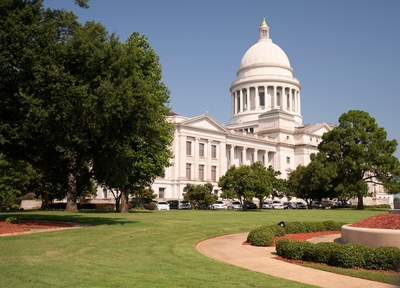
Legal
How State Lawmakers Regulated Marijuana, Hemp, and Kratom in 2025
February 5, 2026 | Kerrie Zabala, Michael Greene
May 10, 2024 | Sandy Dornsife

Key Takeaways:
State high courts issue thousands of opinions each year, and these court decisions have just as much of an impact on public policy as the legislative process. To help you keep track of consequential judicial decisions and their impact on state policy, MultiState publishes the Monthly Court Report, which offers a monthly recap of notable state high court decisions to provide a more dynamic picture of public policy trends.
While the 2024 legislative session saw a continuation of the trend of bills addressing transgender issues, the state supreme courts are already grappling with the bills passed in the previous sessions. One issue that has garnered more and more attention is the regulation of transgender youth participation in sports. Presently, twenty-four states have laws banning transgender students from participating in sports according to their gender identity. Their relatively recent adoption, however, means that precedent regarding the constitutionality of these laws is almost non-existent. Temporary injunctions are already in place in four states while the laws work their way through the judicial system. This month, Montana’s Supreme Court reached a limited decision regarding one of these laws.
In the case of Barrett v. State of Montana, a group of plaintiffs representing various higher education institutions filed a constitutional challenge to the “Save Women’s Sports Act” (HB 112) passed in 2021. This act required that virtually all sports teams “sponsored by a public elementary or high school, a public institution of higher education, or any school or institution whose students or teams compete against a public school or institution of higher education must be expressly designated” by sex and not gender identity. Plaintiffs contended that the law unconstitutionally infringed on the institutions’ right to “oversee student groups and activities.” Defendants argued that the institutions’ lack of a transgender sports policy left a regulatory void that the legislature was permitted to fill. Ultimately, a divided court narrowly sided with the Plaintiffs, finding that the absence of a transgender in sports policy was not a “green light for the Legislature to insert itself and attempt to usurp the Board’s constitutional authority” to make such determinations. However, while the Court’s ruling in favor of the plaintiffs excepts higher education institutions from the application of HB 112, the law still remains in effect for public elementary, middle, and high schools. Since the arguments relied upon in Barrett focused entirely on the institutions’ exclusive oversight authorities, authorities that local county boards of education may not possess, any further challenges to the law will have to look to alternative arguments, such as state and federal equal protection clauses and federal Title IX protections. Despite the fact that the U.S. Supreme Court has denied certiorari for similar cases at least three times, these constitutional questions may force the Court to address the issue sooner rather than later.
Alaska’s Supreme Court found that the City of Valdez was not entitled to recover unpaid property taxes from oil spill prevention and response vessels because the three-year statute of limitations had lapsed. The vessels were originally deemed to be tax exempt by the state, however, the city appealed and won, but only after the statute of limitations had run out. The Court held that the city could have expedited the case to comply with the limit, but did not, and therefore is not entitled to recovery of taxes. Read more.
The Arizona Supreme Court upheld an 1864 law that created a near-total ban on abortions in the state. The law makes the provision of an abortion or assisting a woman in obtaining an abortion a felony punishable by up to five years in prison. This negated a lower court's assertion that the 1864 law needed to conform with the 2022 law banning abortions after 15 weeks. (The legislature has already voted to repeal the statute.) Read more.
Connecticut’s Supreme Court ruled that an employer was precluded from contesting a workers’ compensation claim because, although it was mailed prior to the statutory deadline, it did not arrive at court prior to that date. The Court found that “mailing” and “filing” are two distinct actions, and it was the filing that needed to be completed by the specified date. Read more.
Florida’s Supreme Court delivered two important decisions regarding reproductive rights in the state. While the Court upheld the state’s ban on abortion at fifteen weeks, it also approved a ballot measure to appear in November’s election that could enshrine abortion as a right within the state constitution up to the point of fetal viability. Read more.
In addition to the abortion ballot measure, the Florida Supreme Court also approved a ballot measure to legalize recreational marijuana in the state. The Court’s decision focused solely on whether the amendment met the single-subject and clarity requirements, as well as whether the initiative was facially invalid. Read more.
Idaho’s Supreme Court found that the Idaho legislature was within its constitutional authority when it passed two bills in 2023 related to voter identification. The bills altered the approved methods to prove identity when registering to vote, as well as at the polls. Opponents had asserted that the laws violated the right to equal protection by inhibiting certain groups from voting; however, the court found no such discrimination. Read more.
The Illinois Supreme Court issued an opinion making it easier for companies to sue for defamation, whether or not the disparaging statements are made public. In this case, e-mails including language that could be construed as defamatory were sent to several members of a company’s executive leadership. The Court held that since these members have their own interests separate from the company, disclosure of the e-mails to them qualifies as publication in regards to a defamation claim. Read more.
The Iowa Supreme Court reversed a lower court decision awarding $790,000 to an employee claiming sexual harassment in the workplace. In doing so, the Court relied upon precedent prohibiting plaintiffs from using evidence of similarly prohibited conduct towards others when they were not aware of it during the period in which they allege their harassment. Read more.
The Michigan Supreme Court found that a public sector union’s requirement that a non-member pay for services from the union was a violation of the Public Employment Relations Act. The Court determined that such a requirement discriminated against non-members and infringed on the right of employees to refrain from joining a union. Read more.
Nebraska’s Supreme Court ruled that a nurse is permitted to pursue a workers’ compensation claim after being infected with COVID-19 early on in the pandemic and sustaining long-term medical problems as a result. Despite the fact that COVID-19 is now a “disease of ordinary life,” usually excluded from workers’ compensation benefits, the Court held that the circumstances of the disease in March and April 2020 must be considered. Read more.
The Nevada Supreme Court unanimously upheld the state’s controversial “ghost gun” ban which outlawed unfinished firearm frames or receivers and the manufacture of firearms without a serial number, with very limited exceptions. In doing so, the Court rejected arguments previously accepted by the lower court that the law was unconstitutionally vague. Read more.
Nevada’s Supreme Court found that the regulatory decisions of the City of Las Vegas had fundamentally “deprive[d] a landowner of all economically beneficial use of their property” resulting in a per se taking that requires just compensation. In this case, a developer purchased 250 acres of land to turn into a luxury home community; however, the city rejected his various development proposals. Read more.
The New Hampshire Supreme Court overturned a local planning board’s rejection of a solar project, finding that the board could not reject a project that clearly complied with relevant ordinances, despite “personal feelings.” The board’s initial rejection came after the project’s neighboring residents argued that the project would lower property values and be an eyesore to the community. Read more.
The New Mexico Supreme Court reached a unanimous decision that the state Workers’ Compensation Act limiting workers’ compensation benefits for mental impairment disabilities is unconstitutional. The Act limits the coverage of mental impairments to the duration of the physical impairment, whether or not the mental impairment remains. The Court held that this discriminates against those who suffer mental impairment injuries. Read more.
New Mexico’s Supreme Court issued another impactful decision this month, ruling that gas stations may be held liable for selling fuel to an intoxicated driver. In doing so, it applied the doctrine of negligent entrustment which imposes a duty of care when supplying a potentially dangerous good. New Mexico is only the second state to apply this duty; the other being Tennessee. Read more.
The New York Court of Appeals, the state’s highest court, held that when an entity acquires another’s liabilities and assets, they also acquire that “entity’s status for purposes of specific personal jurisdiction” whether or not the two formally merge. Read more.
The South Carolina Supreme Court held that an employer could not avoid workers’ compensation liability by relying on a report stating that an injury caused by the employee’s work was unlikely. In this case, an employee claimed that their back injury was directly related to the repetitive nature of their work; however, a report from the company asserted that the work was not “repetitive” in nature. The Court found that the opinion of a report was valid evidence to determine if the required elements of the case had been met. Read more.
The Tennessee Supreme Court ruled that employers cannot use the admission of vicarious liability for worker’s actions to avoid direct negligence claims. The decision stems from a slip and fall case caused by the failure of an employee to properly clean a spill in a grocery store. The Court’s decision means that an employer may be both directly and vicariously liable in negligence claims. Read more.
Texas’s Supreme Court found that a state university was not liable in a student’s claim for damages associated with the school’s decision to move classes online during the COVID-19 pandemic. The student had argued that the Pandemic Liability Protection Act, passed in 2021 to provide just such liability protections to institutions, could not be applied retroactively. Read more.

February 5, 2026 | Kerrie Zabala, Michael Greene

February 4, 2026 | Sandy Dornsife

January 26, 2026 | Jason Phillips, Anthony Amatucci